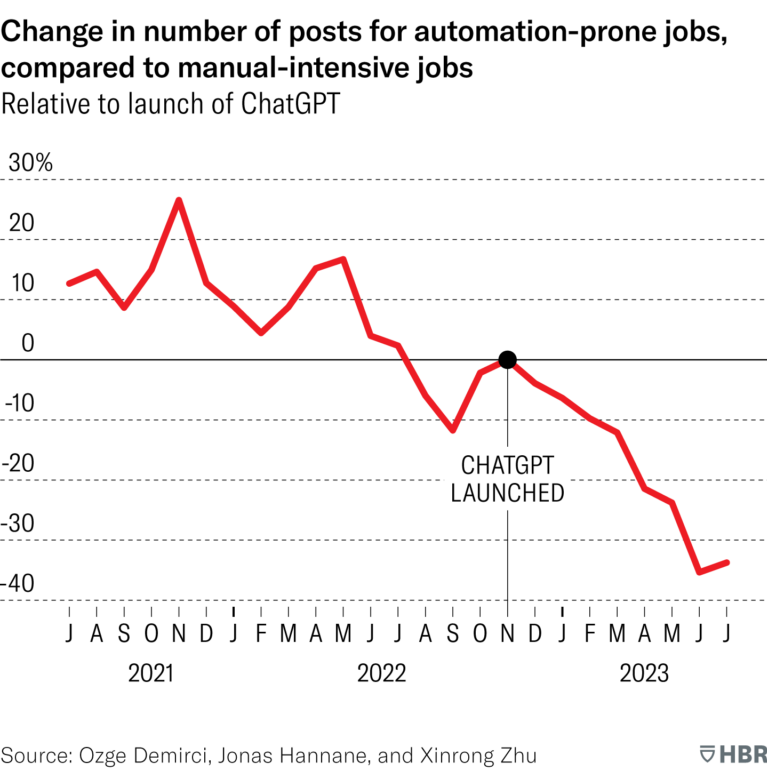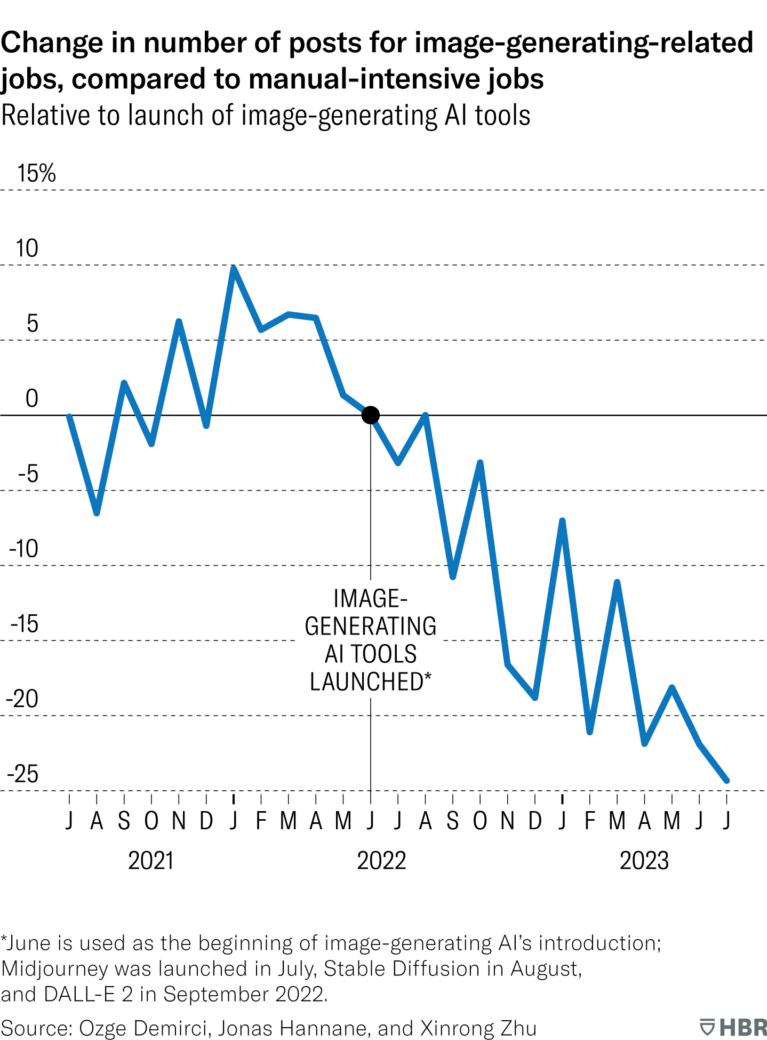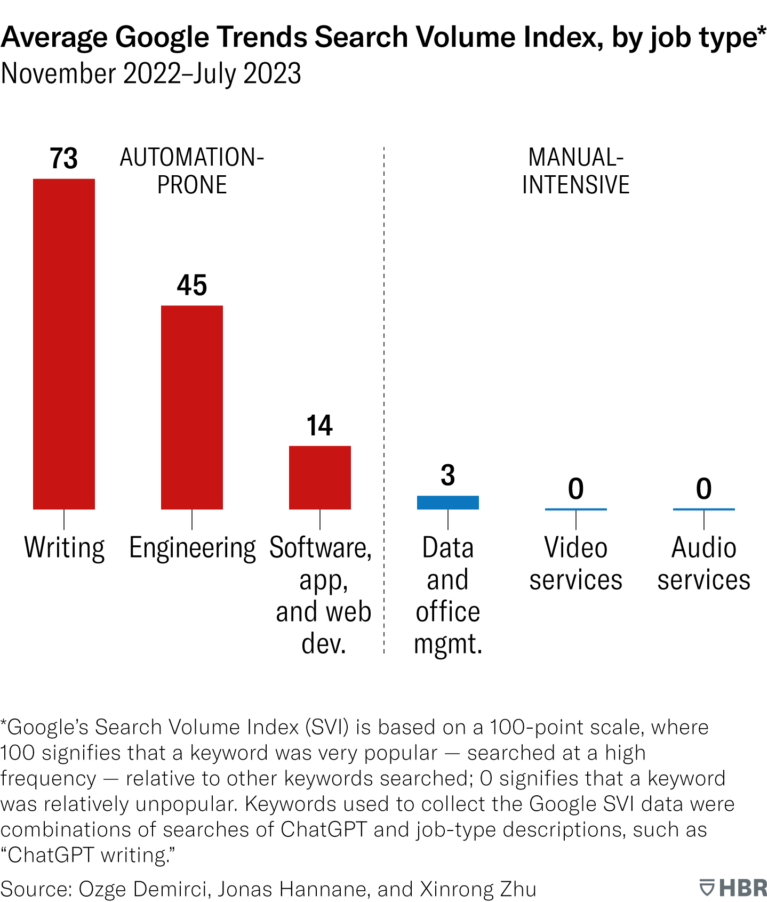Generative AI reduces demand for some freelance jobs in writing, coding and design, study says

A new study shows a measurable impact of ChatGPT on the freelance labor market, with a significant drop in demand for supposedly easily automated work.
The paper, to be published in Management Science, looked at 1.4 million job listings on a major freelance platform between July 2021 and July 2023, reports Harvard Business Review. The research shows demand for jobs that are "automation-prone" fell by an average of 21 percent after ChatGPT's launch compared to manual-intensive jobs.

Writing jobs take the biggest hit
Freelance writers saw the steepest decline, with job postings down 30.37 percent. Software and web developers experienced a 20.62 percent drop, while engineering positions decreased by 10.42 percent.
The impact extends beyond writing and coding. After the release of AI image generators like Midjourney, Stable Diffusion, and DALL-E, job listings for graphic designers and 3D modelers fell 17.01 percent relative to manual-intensive jobs, with no signs of recovery in the job market, according to the study.
The graphic says "image generation", which is a bit misleading because there could be jobs related to using image generation in the AI sense, but the paper says it is about "jobs related to image creation and graphic design." And of course there may be other factors at play, such as the ongoing crisis in the gaming industry.

The researchers note these effects are much stronger than previous automation waves. For comparison, when French industries increased robot use by 20 percent, employment only dropped by 3.2 percent.
They also emphasize that generative AI differs fundamentally from previous automation technologies because it continuously improves and can potentially affect almost every job sector.
More competition, higher requirements
The shrinking job market has also led to increased competition. After ChatGPT's launch, automatable jobs saw an 8.57 percent increase in applications per posting. The number of required skills rose by 2.18 percent, while client budgets increased by 5.71 percent.
Industries that frequently search for AI tools like ChatGPT show the highest job losses. However, manual activities such as audio and video editing, where AI tool interest remains low, have seen minimal impact so far.

ChatGPT becomes a job requirement
While some traditional freelance work seems to decline, AI brings new opportunities, according to the study. The number of job listings requiring ChatGPT skills has grown steadily by 0.68 positions per week since the chatbot's launch. The researchers found 903 job listings that required ChatGPT expertise, with 88 percent in automatable activities and 82 percent in software and web development.
The study also identified a significant gender gap, with women much less likely to use ChatGPT at work compared to men in similar positions.
The researchers recommend that companies focus on training low-skilled workers in AI tools, as this group shows the greatest potential for productivity gains. They note that AI is shifting work focus from predictable tasks to activities requiring human judgment and decision-making.
"Managers will also need to develop new competencies, particularly in AI task delegation. [...] As AI takes on more routine functions, managers must focus on leading teams in ways that leverage the unique strengths of both human and machine capabilities," write the authors of the study. The aim is to make optimum use of the respective strengths of humans and machines.
Update: Clarified that this is a relative change compared to manual-intensive jobs.
AI News Without the Hype – Curated by Humans
As a THE DECODER subscriber, you get ad-free reading, our weekly AI newsletter, the exclusive "AI Radar" Frontier Report 6× per year, access to comments, and our complete archive.
Subscribe nowAI news without the hype
Curated by humans.
- Over 20 percent launch discount.
- Read without distractions – no Google ads.
- Access to comments and community discussions.
- Weekly AI newsletter.
- 6 times a year: “AI Radar” – deep dives on key AI topics.
- Up to 25 % off on KI Pro online events.
- Access to our full ten-year archive.
- Get the latest AI news from The Decoder.